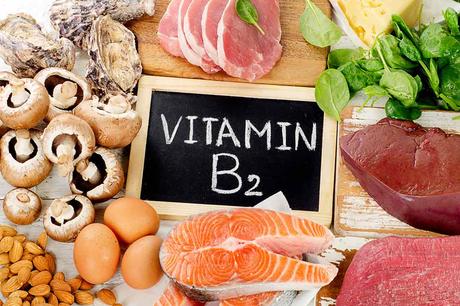
What is Vitamin B2 (riboflavin) used for?
Vitamin B2 (riboflavin) is commonly used for riboflavin deficiency. Vitamin B2 and other B vitamins help in the formation of red blood cells and support other cellular functions that provide energy.
In some situations the need for riboflavin may be greatly increased such as:
- Alcoholism
- To burn
- Cancer
- Diarrhea
- Fever
- Disease
- Infection
- Intestinal disease
- Overactive thyroid
- Serious injury
- Tension
- Abdominal surgery
In addition, riboflavin can also be given when there is an excess of bilirubin in the blood of infants.
Riboflavin is claimed to be effective for acne, some types of anemia (anemia), migraine headaches, and its use for muscle spasms.
BENEFITS OF VITAMIN B2
- Vitamin B2 or riboflavin is an essential vitamin.
- This is necessary to maintain the energy required for metabolism in the body.
- It helps to process nutrients in the cardiovascular system through aerobic energy production and keeps cells in good health.
- This vitamin also improves vision and skin health.
- Riboflavin deficiency causes cracks and redness in the skin and causes problems like swelling in the mouth, ulcers, sore throat and anemia.
DOSAGE: It is prescribed to take 1.3 mg of riboflavin for men and 1 mg for women.
Vitamin b2 foods :
- Carrot- Carrot is one of the most common vegetables. Its most important quality is that carrots contain 5% of our daily requirement of vitamin B2. You can add it to your salad or eat it just like that.
- CHEESE- In addition to being high in cholesterol, high amounts of vitamin B2 are found in cheese. Cheese provides the highest amount of vitamin B2 with 0.57 mg per 100 grams. It is also a good source of calcium and vitamin D.
- Milk- Cow and goat milk are high sources of vitamin B2. It is also a rich source of vitamin B complex and other minerals.
- Almond- Almonds are nuts that contain high amounts of riboflavin. It is also a high source of vitamin E, calcium, potassium and copper. Its health benefits are proved by the fact that 1.01 mmg riboflavin is found per 100 grams.
How do I use Vitamin B2 (riboflavin)?
Vitamin B2 should be eaten along with food and eat exactly as mentioned on the label, or eat it according to the doctor’s advice. Do not use it in large quantities or in small quantities or for a long time unless you are advised.
How do I store Vitamin B2 (riboflavin)?
Vitamin B2 (riboflavin) would be good if you keep it at home temperature and keep it away from direct light and moisture. To avoid worsening of the drug, you should not keep vitamin B2 (riboflavin) in the bathroom or freezer. There may be different brands of vitamin B2 (riboflavin) which may have different storage needs. Therefore, it is necessary that you read the collection information written on the product carefully before purchasing it, or take the information from the pharmacist. For safety, you should keep all medicines separate from children and animals.
Is it safe to take vitamin B2 (riboflavin) during pregnancy or breast feeding?
There is no such study yet on the risk of using vitamin B2 (riboflavin) during pregnancy or during breastfeeding. Please consult your doctor regarding the benefits and disadvantages of using vitamin B2 (riboflavin).
What can be the side effects of vitamin B2 (riboflavin)?
Usually, riboflavin (an active ingredient present in vitamin B2) does not cause any side effects. Talk to your doctor if you experience any side effects and see any other side effects. If you notice any symptoms associated with an allergic reaction to riboflavin, seek emergency treatment as soon as possible: hives, difficulty breathing, swelling of the face, tongue, lips, or throat.
What medicines cannot be used with vitamin B2 (riboflavin)?
Vitamin B2 (riboflavin) should not be used together with the medicines taken, this may alter the function of the drugs or increase the risk of serious side effects. To prevent any medication from being mislabeled, you should keep a list of medicines used (including prescription medications, over-the-counter medicines and herbal products) and then with a doctor or pharmacist Share.
Can vitamin B2 (riboflavin) be used with food or alcohol?
Vitamin B2 (riboflavin) can cause misalignment with food or alcohol by changing the way the medicine works or increasing the risk for serious side effects. If you do not see any right results with food or alcohol before taking this medicine then talk to your doctor or pharmacist.
How can eating vitamin B2 (riboflavin) affect health?
Vitamin B2 (riboflavin) can have an adverse effect on your health status. This effect can worsen your health status or reduce the way the medicine works.
